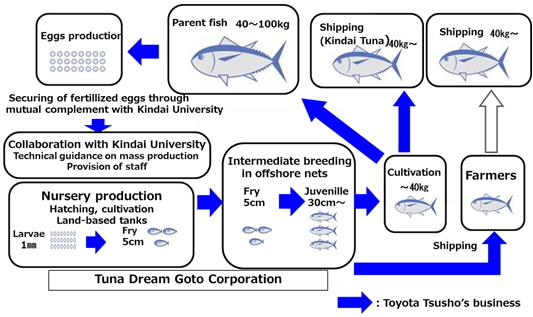Toyota Tsusho to Export Sustainably Cultivated Marine Products Backed by Japanese Quality Standards
-Kindai Tuna cultivated from hatchlings to be exported-
- (former)Food & Consumer Services
2017-10-05
Toyota Tsusho Corporation ("Toyota Tsusho") and Kindai University announce today they will begin full-scale exports of sustainable full-cycle aquaculture products. The first products to be exported will be full-cycle aquaculture Kindai Tuna*1, produced jointly by Toyota Tsusho and Kindai University, and Japanese amberjack*2 similarly handled by SHOKU EN Co., Ltd., which receives technological support from Kindai University. Toyota Tsusho and Kindai University plan to expand the export business to other types of fish in the future, thereby enhancing the reputation of delicious cultivated marine products backed by high Japanese quality standards, opening new markets around the world, and revitalizing one of Japan's primary industries.
<Key Points>
1. We begin to export Kindai Tuna, the world's first bluefin tuna produced through full-cycle aquaculture process pioneered by Kindai University
2. Full-cycle aquaculture Japanese amberjack will also be exported in addition to Kindai Tuna
3. Toyota Tsusho and Kindai University will open new markets for sustainably-raised marine products by exploring exports of various farmed fishes
In July 2010, Toyota Tsusho and Kindai University formed a comprehensive technological tie-up to develop full-cycle aquaculture for bluefin tuna, leading to the world's first successful commercialization of bluefin tuna intermediate breeding. In July 2014, the partners signed a memorandum of understanding on jointly promoting the marine cultivation business and started the rearing of juvenile bluefin tuna at a hatchery in Japan. Since December 2014, we started the harvesting and sales of Kindai Tuna as the next step to provide stable supplies of sustainably raised bluefin tuna. The newly launched export business is one of the initiatives under our agreement. First exports will be to Southeast Asian markets, and by 2020, the partners plan to export approximately 2,000 fish annually.
In recent years, concerns have been raised about the depletion of wild bluefin tuna stock, which was listed as an endangered species in 2014. Japan and other countries are taking steps to further regulate catches. Interest in full-cycle aquaculture of bluefin tuna has risen amid the growing movement to protect and conserve the wild populations.
Japanese amberjack, meanwhile, is a species fished mainly around Japan. While the highest demand has been from Japan, demand in other countries is also increasing due to the surging amid the popularity of Japanese cuisine. The market for Japanese amberjack is expected to continue growing.
Toyota Tsusho continues to work on the stable supplies of hatchling reared juveniles for full-cycle aquaculture of bluefin tuna as a core business. It will also lead integrated production of Kindai Tuna from eggs to harvest size, along with the export sales of both full-cycle aquaculture Kindai Tuna and full-cycle aquaculture Japanese amberjack. Kindai University will continue its world-class research and technology for aquaculture development to further expand the sustainable culture of marine products. Together, the partners will aim to ensure stable supplies and improve the quality of juvenile fish for farming, while opening new export markets outside Japan for leading brand Kindai Tuna as well as full-cycle aquaculture Japanese amberjack backed by Kindai University's advanced technologies to support one of Japan's primary industries.
*1 Scope of Toyota Tsusho and Kindai University partnership
*2SHOKU EN Co., Ltd. and Japanese amberjack produced through full-cycle aquaculture.
SHOKU EN processes and sells full-cycle aquaculture marine products, primarily Japanese amberjack, at a plant with world-class hygienic standards, using technological support from Kindai University to open new markets for the development of Japanese aquaculture industry. To further develop the business, SHOKU EN will also process Japanese amberjack from fish farmers using Kindai University's Juveniles, and freeze fillets for sales within and outside Japan.
Outline of Toyota Tsusho
|
Company name
|
Toyota Tsusho Corporation |
|---|---|
|
Headquarters location
|
Nagoya, Aichi Prefecture, Japan |
|
Date of establishment
|
July 1, 1948 |
|
President & CEO
|
Jun Karube |
|
Number of employees
|
Unconsolidated: 3,614 Consolidated: 57,988 |
Outline of Kinki University
|
Company name
|
Kindai University |
|---|---|
|
Headquarters location
|
Higashiosaka City, Osaka Prefecture |
|
Date of establishment
|
1925 |
|
President & CEO
|
Yoshihiro Shimizu, chairman; Hitoshi Shiozaki, president |
|
Number of employees
|
Consolidated: 53,114 |
The information in this release is current as of the date of announcement.
Please note that information may change after the date of announcement. Thank you in advance for your understanding.



